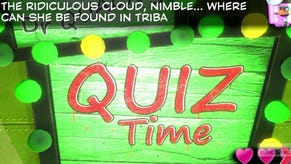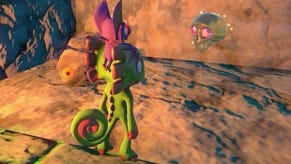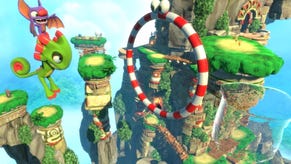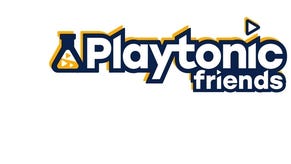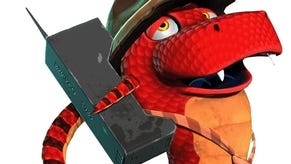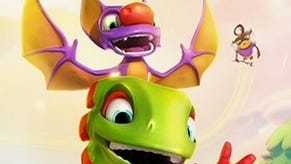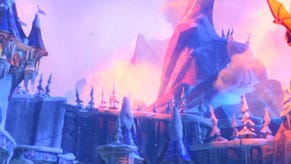Does Yooka-Laylee really have performance problems?
Digital Foundry runs the rule over PS4, Xbox One and PC versions.
Two years after a hugely successful Kickstarter campaign, Yooka-Laylee from Playtonic Games is ready for action. At its core, Yooka-Laylee draws platform gaming inspiration from the Nintendo 64 era, specifically tapping into Banjo Kazooie and its sequel, which makes sense considering that a number of key ex-Rare staffers helped form Playtonic. From a design standpoint, this is a decidedly retro affair and one that we had a lot of fun playing, but there has been plenty of controversy surrounding its performance - and we wanted to put that to the test.
At the most basic level, Yooka-Laylee is built upon the Unity Engine - a technology that has had several controversies surrounding its performance level on console. Playtonic's release is also one of the more ambitious, best-looking Unity games we've seen. It features a wide selection of very large, complex maps with excellent lighting, great texture work and smooth animation. The PC version was created in-house by Playtonic itself but Team 17 assisted the team in bringing Yooka-Laylee to Xbox One and PlayStation 4. Put simply: is Unity up to the job of delivering on console?
Perhaps not surprisingly, the PC version is the best way to experience the game, but Team 17's ports deliver nicely. Both PS4 and Xbox One operate at full 1080p with excellent texture filtering and a very nice soft depth of field applied to distant objects. Anti-aliasing isn't of the highest quality but with the soft focus effect in play, the overall impression is that Yooka-Laylee delivers great image quality. Those looking to ramp up resolution or frame-rate on PS4 Pro are going to be disappointed - there's no native support, meaning that boost mode is the only way to theoretically extract any additional performance.
But the reality is that we encountered no frame-rate issues on PlayStation 4 at all. We tested the title on base hardware and with boost mode enabled on Pro and the end result is identical - a completely locked, properly frame-paced 30fps. Performance is entirely consistent with the day one patch in place, but in actual fact, we tested the pre-update review code too and found a level, locked frame-rate there too. We never managed to trigger any stuttering or slowdown at all. Could it happen? Of course, we can't cover every single corner of the game, but you can expect your general experience to be very stable.
It's seems that Xbox One received the bulk of the criticism and seemingly for good reason - many sites reported huge stuttering and slowdown during gameplay, and you can see that in this video from GameXplain. We played a small chunk of the game pre-patch but never managed to reproduce these issues. One thing to keep in mind is that Xbox One has a nasty habit of introducing performance issues on a minority of titles when the suspend mode is used, and as a result we always capture footage after a full reboot in order to ensure that performance is optimal.
It's difficult to say why some systems were suffering from such severe problems while others did not, but clearly, it's a 'your mileage may vary' situation. A patch was issued last week designed to improve performance and camera problems, and as this is the day one experience, that's what we're using in our performance video- and it runs just fine on our Xbox hardware.
After playing more than 10 hours and running more than 40 minutes' worth of gameplay through our frame-rate analysis tools, performance came back with a near perfect 30fps lock. Throughout all of this footage we encountered just one hitch in gameplay. Other than that, the Xbox One turned in a very stable frame-rate. For good measure, we tested the game on both an Xbox One and the Xbox One S. At least one of the reviewers who ran into stuttering problems was playing on an Xbox One S but we've tested both consoles with equal results.

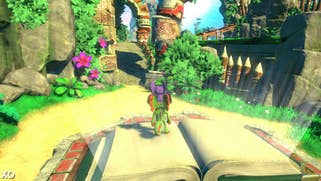
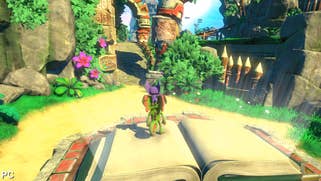
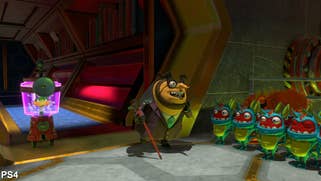
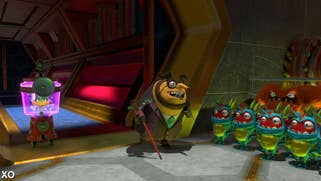


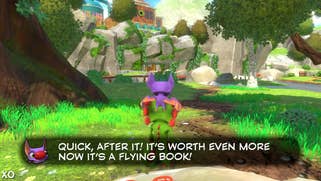
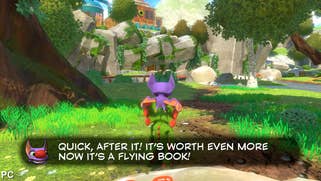
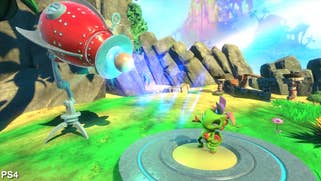
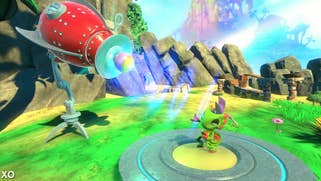
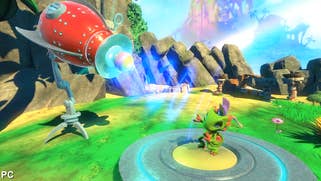
The Xbox One version of Yooka-Laylee has just one Achilles Heel though: alpha effects. The price you pay for resolution parity between Xbox and PS4 becomes evident when the camera comes into contact with transparent GPU effects such as fire particles. This reveals that Yooka-Laylee is using a double buffer v-sync solution so when the rendering time exceeds 33ms, the game drop to 50ms updates until it recovers - meaning short bouts of 20fps gameplay in these isolated areas. Thankfully, scenes such as this are not especially common in the game but when you run into it, it's nice to know why it's happening. PS4's wider memory bandwidth ensures that the same issues never crop up at all in similar scenarios.
In terms of visual features, both console versions are otherwise very close, with only shadow-map definition separating them to any noticeable degree. What we really like about the look of the game is the richness in the environment detail. The art design has allowed the team to evolve the look of games such as Viva Pinata or Kameo with an incredible amount of detail poured into every surface - and this means it's party time for the PC version, where GTX 980 Ti/GTX 1070 class graphics hardware scales up this game effortlessly to 1440p at a locked 60fps. Indeed, if you can handle dips in performance similar to Xbox One's when dealing with alpha effects, this same level of GPU hardware takes you all the way up to 4K at an otherwise solid 60fps.
If there's a disappointment with the PC version, it's the fact that the options menu is bereft of granular tweaking, meaning you're stuck with a very basic set of selectables, along with a 30fps option. That said, you can at least see the changes the settings make to the visuals as you cycle between the quality presets.
As things stand, all three versions of Yooka-Laylee are solid but if you have a reasonably capable PC, clearly this release is the way to go. The game plays fine at 30fps, but the higher frame-rate is certainly preferable in a platform game such as this. If you'd prefer to stick with the console versions, our tests indicate that despite the negative pre-release coverage, your day one experience should be fine. Those strange hitches that have occurred for some Xbox One users are mysterious but realistically, should not impact most players.
The only wild card now remains the Nintendo Switch version. A couple of Unity games are already available on the Switch and they're generally quite acceptable, but Yooka-Laylee is clearly a step beyond the likes of Bomberman R and I Am Setsuna. We'll follow up with coverage on that version as soon as we can.




